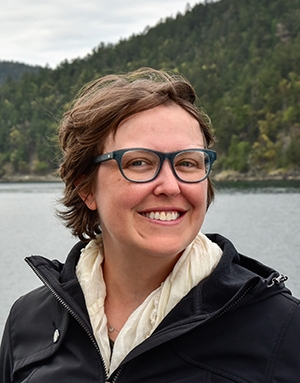Assistant Professor of Environment and Sustainability
What sub-field of ecology do you study?
I would say that I'm mostly a community ecologist, but I use many tools and concepts from population and landscape ecology as well. I focus on the impacts of environmental change on fish communities in lakes and streams. I've recently been working on the impacts of climate change, species invasions and habitat alteration on fish communities.
Tell us about one of your current research projects. How does it relate to the questions you're interested in as an aquatic ecologist?
For a long time, I've been interested in understanding the relative roles that environment and species interactions have on ecological patterns. My research has demonstrated that with climate warming, warmwater-adapted predatory fishes, like bass, have spread into lakes that were previously too cold and beyond the northern boundaries of their historical distributions. One of the things I'm working on now is how climate change impacts cool and coldwater-adapted fishes, including walleye and trout, directly by changing their environments and indirectly by increasing competition from warmwater species. I'm using monitoring data to examine patterns of relative abundance across regions and current ecological patterns in warmer climates to predict what will happen to fish communities under future climate-scenarios. I'm also planning a manipulative experiment altering temperature and competition in replicated ponds.
What are the particular methods and locations you tend to use for your research?
My work ranges from regional scale observational studies to small scale experiments in the lab and in the field. I am also using a combination of natural history collections, monitoring data, and field surveys to look at changes in fish communities through space and time. I use this data to develop statistically based tools that can help to predict impacts and adapt management practices.
Most of my research is in temperate lakes and streams in the Great Lakes basin and in Ontario. I'm also interested in the generality of ecological principles and how fish communities in the tropics function in similar and different ways from temperate communities. I've been working with collaborators, here and in South America, to understand the impacts of disturbance related to gold-mining on fish communities in streams on the Guyana Shield.
Who do you collaborate with, and who would you like to collaborate with in the future - both organizations and academics from various fields?
My recent research in Ontario has been based on strong collaborations with researchers from resource management agencies, including the Ministry of Natural Resources and Forestry. I'm excited to grow collaborations with resource managers and government scientists in Michigan and the Great Lakes region. I'm also eager to work with collaborators in a variety of disciplines, including data scientists, hydrologists, and engineers. Because of the socio-environmental dimensions of fisheries, I would like to collaborate with social scientists, political scientists, and economists but also work with stakeholders to co-develop sustainable approaches to managing aquatic ecosystems.
What are some ways your science has been used, or could be used, by practitioners?
One of my primary goals is to use fundamental ecology to improve the management of aquatic communities and ecosystems. My research has shown that ecological traits can be used to predict which species are likely to shift their distributions in relation to climate change and what impacts they will have on native species as these shifts occur. Habitat and landscape characteristics seem to be important in predicting changes across a large region and identifying which sites are most vulnerable to species introductions. But my work also shows that the characteristics of native populations and communities contribute to the stability and resilience of aquatic systems and this helps practitioners to evaluate management practices and policies.
